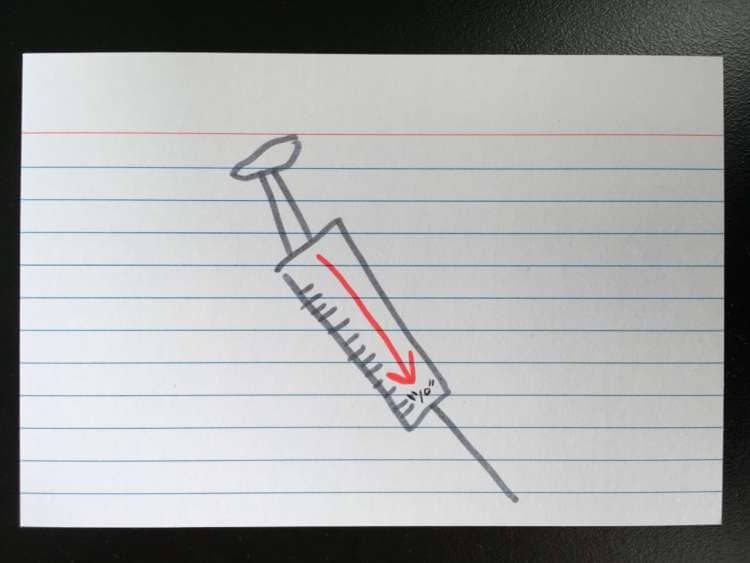How to Learn Medical Terminology the Easy Way
 Is medical terminology hard to learn?
Is medical terminology hard to learn?
Only if you lack a proven process for organizing your medical mnemonics so that you can commit large volumes of it to memory.
With the simple memory skills you're about to discover you'll be able to handle any amount of medical terms efficiently.
But therein lies the catch. (There's always a catch.)
In order to learn anything efficiently, you need an effective approach first.
Yes, it can feel like taking a step backwards in order to learn how to learn.
But it's worth it because you'll save so much time once you have the fundamentals down pat.
So if you want to study medical terminology with great speed and efficiency, give the tips on this page a try.
How to Learn and Remember Medical Terms: 6 Tips
I'm going to teach you how to remember medical terms in a very special way.
It's based on thousands of years of tradition, and many doctors have used this approach.
However, before we get into the technique itself, this step is important.
One: Organize the Medical Terms So You Can Use Medical Mnemonics Effectively
Many medical students try to memorize directly from textbooks or flash card decks that have been prepared for them.
There are a few problems with this:
- You risk taking on too many terms at once
- You easily lose different terms
- You cannot easily reorganize the information
- You cannot personalize your list of terms
To combat this, I suggest you create your own flash cards by hand.
Incorporate colors and simple drawings as much as possible.
For example, for hypotension (low blood pressure), I drew a simple hypodermic needle.

Making your own medical mnemonics is the key to lasting success. It just takes a second to come up with an impactful image and draw it on a card. You don't have to be an artist.
I placed a red arrow facing down to indicate the notion of "low."
There's a "10" in quotation marks to remind me of the "tension" part of this basic medical term.
This form of learning might seem counterintuitive, but it falls perfectly in line with the science of active recall .
It works as an alternative to rote learning because you're causing your mind to solve a puzzle. As you look at the image and guess at what term it's supposed to help you remember, your brain starts to form very strong memories.
There's a lot more to say about extracting information onto cards in an optimized manner. Check out how to memorize a textbook for a full tutorial. And watch this:
>>> Yours Free: A Private Course With Cheat Sheets For Becoming A Memory Master, Starting From Scratch.
Two: Use A Memory Palace
As you study medical terminology from your cards, place each medical mnemonic into a Memory Palace .
This technique involves using a familiar location to help you place and revisit associations so you can remember more information faster.
The best part?
It's been well-studied and proven to help medical students in particular.
Both Dr. David Reser and Dr. Tyson Yunkaporta have been on the podcast to explain more about their experiences with helping medical students use this approach to rapidly absorb terminology.
Of course, just because we know this mnemonic device works, does not mean you'll master it straight out of the gate.
You might need to troubleshoot things from time to time, which is why I created this powerful tutorial on removing all problems you might have with the Memory Palace technique.
And if you're worried that you won't have enough Memory Palaces you can use, please set that worry to rest. Here's a full tutorial on how to find any number of Memory Palaces. It will prove to you that you cannot run out of this powerful mnemonic device. I promise.
Three: Deepen Your Medical Mnemonics
As you practice the Memory Palace technique, it's important to include rich and vibrant associations.
Instead of placing a generic hypodermic needle in the corner of a room to remind you of hypotension, you'll want to make the association specific.
For example, you can put in the hands of a famous doctor, like Hannibal Lecter . The more specific your association, the more it will leap out at you as you review your Memory Palace.
Also, be sure to add multisensory levels of visualization . For example, add these elements:
- Kinesthetic (how heavy is it?)
- Auditory (what sounds does it produce?)
- Visual (what colors and shapes do you see?)
- Emotional (what do you and your associative characters feel?)
- Conceptual (what other ideas come to mind?)
- Olfactory (can you add a sense of taste?)
- Gustatory (can you add a sense of smell?)
- Spatial (can you exaggerate the sizes involved in your association?)
By touching on most, if not all of these elements, you'll find that the target medical terminology leaps to mind with greater speed and ease.
Three: Contextualize
No information exists in isolation.
As you memorize each term, think about one or more ways that it connects to something else you've learned.
To stick with our example of hypotension, and obvious connection is hypertension, its direct opposite.

Take a moment to mentally connect the symptoms to an image (i.e. a medical mnemonic) of a person experiencing those symptoms. Memory formation works much better if the person is familiar to you.
But you can also go further and think about related issues, such as dizziness and other problems that might cause such a symptom.
Literally visualize someone suffering from dizziness and make as many connections as you can, such as to someone whose name starts with the letter 'D'. Dracula, for example.
The more time you spend making mental connections, the more you'll benefit from active recall.
You can perform this kind of mental contextualization all day long while completing random tasks. But for best results, always set time aside for this type of deliberate practice .
Four: Recall Your Medical Mnemonics Mentally & Physically
As you use a Memory Palace, it's important to recall the information you've encoded.
In other words, you think about the exact location for each medical term. Then you ask, "What was happening there?"
You then allow your associations to come to mind as you work your way back to the target information.
I suggest you practice this mentally at least five times the first day.
But I also highly recommend that you write out the answer with pen and paper as well.
You should also speak it out loud to get the benefits of hearing yourself speak it and involving the muscles in your mouth.
Also read a few different articles about the term, even if only very quickly. Try to also dig up a few podcasts so you can hear other people talking about it.
Is medical terminology hard?
Only if you're robbing yourself of this incredibly powerful way of learning. It's related to a principle called levels of processing and will make everything much, much easier.

Five: Practice Tests
Why sweat your next exam when you can practice in advance?
At many schools, you can actually request example exams. Often, they are the exact exams that were administered in previous years.
Failing that, you can look back at your textbooks and design your own. They often supply questions you can use.
You also don't have to test yourself alone. Find other people who are similarly success oriented and test each other.
Another powerful way to test yourself is to find out where your exams will take place. Visit the room. Get used to it. Complete a practice exam while sitting in it or at least near it.
This will help you manage any nervousness you feel about the exam. It will also remove the hassle of finding the location on the day of the exam itself – one less thing to worry about.
Six: Study From Doctors Who Have Mastered Medical Mnemonics Memory Techniques
On this page, I've given you a powerful introductory overview of how to learn medical terminology.
Many of my students have used them, and I'm delighted whenever they send their success stories. Like Dr. Joe Riffe:
>>> Yours Free: A Private Course With Cheat Sheets For Becoming A Memory Master, Starting From Scratch.
And I'm a doctor myself – just not the medical kind. My PhD is in Humanities.
But the good news is that everything I've suggested on this page is not only scientifically valid.
It also relates directly to how actual doctors have used memory techniques to succeed.
For example, Alex Mullen and his partner, Cathy Chen , are incredible teachers of these techniques. They often focus specifically on topics related to learning all kinds of aspects related to medicine.
As they advise, it's a good idea to master your memory before you start medical school .
Another great person to follow is Chase DiMarco who presents the Medical Mnemonist podcast .
You simply cannot go wrong by diving in as deeply into the memory arts as you can.
The Best Way To Learn Medical Terminology
We've covered a lot of ground today.
But there's one principle we've glossed over.
It's been lurking in each and every word, but hasn't yet been explicitly spelled out.
That word is:
Action.
In order to optimize your learning, you need to get started and keep moving.
Rest assured, I've seen incredible feats of memory. For example, during one afternoon at a competition event with memory expert Dave Farrow , I saw real miracles unfold.
People who had never heard of memory techniques before give Dave a run for his money – and he holds two Guinness World Records for his memorization feats!
But without some level of devoting yourself to these skills, I'm afraid the truth is rather bleak.
So let's get it out of the way quick:
You do need to spend a bit of time learning to use memory techniques if you want them to work for you.
I don't see that as a problem in the same way I don't see building an airport a problem if you want to help people travel the world.
And learning these techniques is WAY easier than that.
So what do you say?
Are you ready to let the magic of memory work for you?
If you'd like even more help, register now for my FREE Memory Improvement Kit right here:

It will teach you how to create a full Memory Palace Network that expands to accommodate as much medical terminology as you'll need to succeed.
And the best part is that later you'll be able to memorize the names of your colleagues and patients. You can even pick up knowledge from other professions and learn at least one other language too.
And that will be especially great if you eventually want to travel and practice medicine in other countries.
You absolutely can, and all you need is to make sure you've got memory on your side.
And now you do!
Source: https://www.magneticmemorymethod.com/how-to-learn-medical-terminology/
0 Response to "How to Learn Medical Terminology the Easy Way"
Enregistrer un commentaire